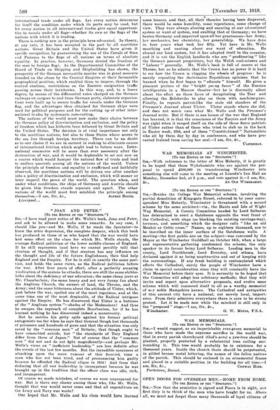"JOAN AND PETER."
[TO THE EDITOR OF THE "SPECTATOR.")
SIR,—I have read your notice of Mr. Wells's book, Joan and Peter, and ask to be allowed to make some remarks. In any ease, I should like you—and Mr. Wells, if he reads the Spectator—to know the utter depression, the complete despair, which this book has produced in those of us who hoped that the war would have had some effect on the class for which Mr. Wells stands, the average Radical politician of the lower middle classes of England. If he still represents (and here we cannot possibly tell) that stratum of thought, and if that stratum has any influence on the thought and life of the future Englishman,' then God help England and the Empire. For he is still in exactly the same posi- tion, and holds the same views, as the Radical politician before the war. After four years of effort, after a perfectly amazing vindication of the system he attacks, there are still the same shibbo- leths about the deficiency of our education; the same cheap jeers at Mr. Chamberlain; the same heavy and not very funny fun about the Anglican Church, the owners of land, the Throne, and the Army; and the same bitterness about the attitude of Ulster, which, just before the war, spoiled one of the most ingenious, and at the same time one of the most despicable, of the Radical intrigues against the Empire. He has discovered that Ulster is a buttress of the "Anglican system "—shades of the Moderators! And thus he escapes the reproach of complete Bourbonism, for if he has learned nothing he has discovered indeed a monstrosity.
But he carries his petty spite against his former political antagonists too far when he says that General Gough lost thousands of prisoners and hundreds of guns and that the situation was only saved by the "common men " of Britain; that Gough ought to have committed suicide, but "the standards of Tory England differ from those of Japan." Not of course that the "common men" did not and do not fight magnificently—and perhaps Mr. Wells's views on " inefficient leadership" are less definite after the events of the last few months. But the incredible meanness of attacking upon the mere rumour of this feverish time a man who has not been tried, and of pronouncing him guilty because he offended the Radical clique in 1914! And from that deducing that all our leadership is incompetent because he was brought up in the tradition that the officer class was idle, rich, and incompetent.
Of course we made mistakes, of course we were unprepared for war. But is there any shame among those who, like Mr. Wells, thought that war would never come and that all expenditure on the Army and Navy was waste?
One hoped that Mr. Wells and his class would hare learned some lessons, and that, all their theories having been disproved, there would be some humility, some repentance, some change of view. They were always abusing and sneering at our educational system or want of system, and exalting that of Germany; we have beaten Germany and improved upon all her greatnesses—her Army, her mechanics, her chemistry, her generalship. We have done in four years what took her fifty. Yet here is Mr. Wells mouthing and ranting about our want of education. He abused our land system, but it has adapted itself to the occasion, and it is not the English landlords who are " profiteering " like the German peasant proprietors, but the Welsh coal-miners and " Labour " generally. Mr. Wells's book is full of sneers at the Throne, but as he admits that the Crown has no power it is hard to see how the Crown is clogging the wheels of progress: ho is merely repeating the doctrinaire Republican opinions that he learned when he first began to " educate " himself. He gives a pleasant picture of the "bright young faces" of the Russian intelligentsia in a Moscow theatre—but he is discreetly silent about the effect on those faces of decapitating the Tsar and allowing the Bolsheviks to play on them with machine-guns. Finally, he repeats parrot-like the stale old slanders of the Freeman's Journal about Ulster. Ulster stands where she did, and does not much care what Mr. Wells and the Freeman's Journal write. But if there is one lesson of the war that England has learned, it is that the conscience of the Empire and the Army was right when it ranged itself on the side of those fierce patriots of Ulster rather than of those who tried to stab us in the back in Easter week, 1916, and of those "Constitutional" Nationalists who sit by them day by day in conference, and who -have pre, vented Ireland from saving her soul.—I am, Sir, &c.,
ULSTERMAN.


































 Previous page
Previous page